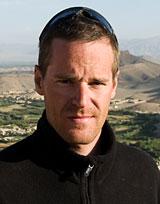
Cairo Journal: February 4
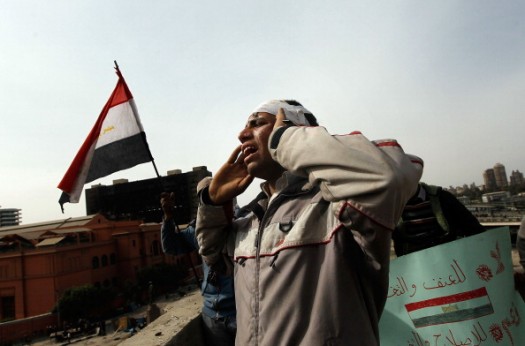
A wounded anti-government protester sounds out the Muslim call to prayer from a rooftop on the edge of Tahrir Square. (Chris Hondros / Getty)
When I unzipped my rolling suitcase for the customs official at Cairo International Airport on Thursday night, February 3, a look of horror seized his face. “Koolu memnouaa,” he whispered to himself. “Everything is prohibited.”
I pretended not to understand and awaited his questions. Journalists coming into the country had involuntarily stocked up a warehouse of cameras, microphones, and satellite Internet devices at Cairo International, and the other journalists at baggage claim were joking that there would soon be a booming market in top-notch electronics at the backdoor of the airport. Nobody laughed much; that day had been a day of terror in Cairo, with more than twenty foreign journalists arrested “for their protection” by the Egyptian government, and with scores more harassed and beaten by thugs. I’d already heard from Nadia Shira Cohen that she’d had to hide in an Egyptian army tank to escape an angry mob. An Egyptian photographer was shot by a sniper and later died from his wounds, and two foreign reporters were stabbed.
Anti-government protesters fared worse—pro-Mubarak henchmen rained Molotov cocktails made from petrol cans down on them from rooftops and balconies surrounding Tahrir, and a group of thugs on horses and camels made a full-out cavalry charge on the crowds.
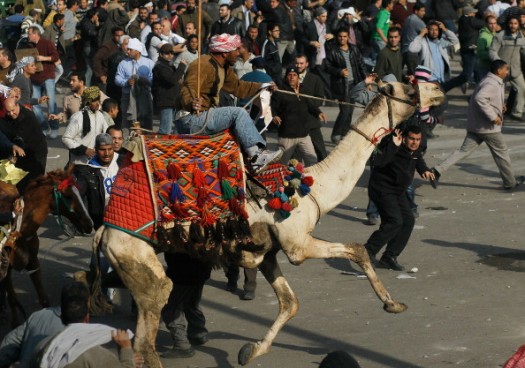
A supporter of embattled Egyptian president Hosni Mubarek rides a camel through the melee during a clash between pro-Mubarak and anti-government protesters in Tahrir Square on February 2. (Chris Hondros / Getty)
The incident reports left me with a queasy stomach and a needling desire to get to the action fast. First I had to get through customs.
“What is your profession?” asked the guy searching my gear.
“Researcher,” I said. Another journalist who I’d befriended on the plane and who hit customs before me got snagged and taken for questioning. I feared I was in the jaws of the beast, about to become the next victim.
“What kind of research do you do?”
“Environmental research.” This was a partial truth; I did spend six weeks in 2010 researching Cairo’s informal garbage collectors and recyclers for a forthcoming VQR story, and I did visit the Ministry of Environment.
The customs official called over his supervisor, who recoiled with at the sight of the arsenal I was carrying:
• Two SLRs
• 70-200mm, 50mm, and 17-35mm lenses
• A video camera
• A point & shoot camera
• Two microphones and an audio recorder
• Eleven memory cards
• Three external hard-drives
• A laptop
• Enough cables to wire three boroughs of New York City
The supervisor asked, “Is he part of the media?”
Almost defensively, my original inspector replied, “No, he does environmental research.”
“Environmental research?” the supervisor asked, no trace of incredulity in his voice. “Does he have any more electronic equipment in his bag?”
My guy turned to me, “Do you have any more electronic equipment in your bag?”
“No,” I shrugged. “Just a tripod.”
“Nothing else?” the supervisor asked.
“No. Just clothes.”
The next thing I knew, I had my passport in hand and I was standing in the terminal—I could hardly believe my luck.
The journalist who’d been sequestered by customs—Oren Dorell from USA Today—eventually emerged, fully intact, less one satellite Internet terminal. We had planned to travel downtown together, and there was a limousine company willing to make the trip for forty bucks. The dispatchers came just shy of calling us pansies for voicing our concerns about security on the road. One dispatcher told us he was so sure we’d be fine that he’d ride with us the whole way.
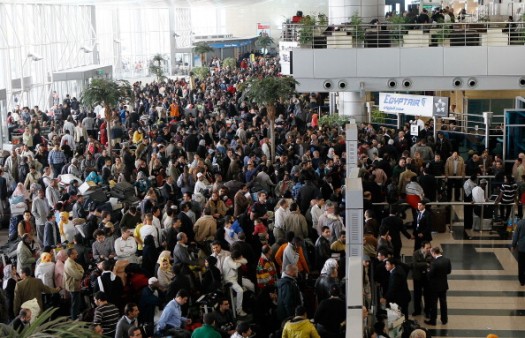
A large crowd looking for a flight out of Egypt waits in the hall of Cairo International Airport. (Chris Hondros / Getty)
We ruminated on the chilling tale of a young Coptic Christian we met who’d been held up at gunpoint on his way to the airport, and we mulled over our friends’ none-too-comforting news that western journalists were the target du jour. Just about everyone we knew in Cairo had been chased or beaten in the previous forty-eight hours. One of my friends wouldn’t raise her voice above a whisper when I called to get her assessment of the situation. We had planned to link up the following day, but when I asked her where she was staying, she said, “I probably shouldn’t say over the phone.”
We placed our testosterone on one side of the scale and our rational minds on the other. The news that ABC’s Brian Hartman had been carjacked and threatened with beheading on the airport road earlier in the evening tipped the scales to the side of caution, and we decided to plunk down on the floor and wait out the dawn.
Of course we weren’t the only ones—hundreds of Egyptians and foreigners were sprawled on the terminal’s seats and floors, crammed into the Puro Gusto restaurant (where you can buy an inedible pastrami sandwich and soda for twenty dollars), and milling around like bleary-eyed jet-setting zombies.
* * *
“Mish mumkin,” the taxi drivers told us, fingers wagging. “Not possible.” Whatever Kool-Aid the limousine dispatchers had been sipping the night before had run out before sunrise. They were nowhere to be found in the morning, and the taxi drivers outside—for whom the word aggressive would usually be woefully inadequate—didn’t even want to be seen talking to us once we said we wanted to go to Zamalek, the embassy-strewn neighborhood next to downtown where we had both booked hotels. To get there, we would have to cross one of three bridges linking Zamalek to downtown, and we would pass through neighborhoods adjacent to Tahrir Square, where street-battles had been raging between anti-government protesters and pro-Mubarak thugs.
“If you go to downtown, that’s your life,” one driver said. “I can promise you will not come back.”
He went on: “Go back into the airport and fly back to whatever country you came from. That’s the best thing for you.”
After a few minutes, one driver sidled up and said, sotto voce, “How much?”
Neither Oren nor I flew all the way to Cairo to cover the chaos from the international terminal (as some reporters had been doing). We agreed on a price and decided to roll the dice.
Except for occasional beige tanks and armored personnel carriers, the airport highway was deserted. It was Friday—the Muslim day of prayer, when stores close and families often sleep in before going to the mosque for Friday prayers. I expected the highway to be quiet on Friday, but in more than a dozen trips to and from the Cairo airport, I have never seen the road so completely emptied of life.
We sped down the highway in our rattletrap taxi. I slouched in the back and Oren—who said he was commonly mistaken for an Arab while working in Iraq—sat up front. Soldiers waved us on at a half-dozen army checkpoints, and soon we were crossing over the train station and past the normally thronged Ramses Square. The effect of the emptiness was eerie, but we were relieved that we hadn’t stumbled into any ne’er-do-wells. Oren wondered if the dramatics at the taxi stand were just a team con designed to jack up prices on a slow business day. When we mounted the ramp for the 26th of July Bridge to Zamalek, I breathed a sigh of relief—we were seconds from home.
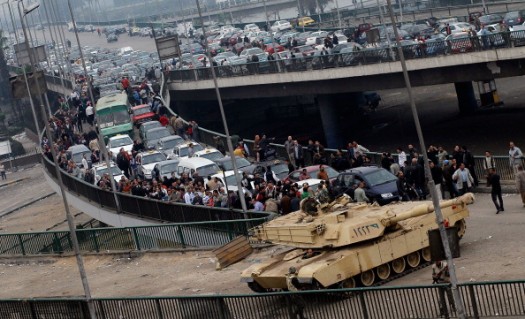
An Egyptian Army tank blocks traffic on an overpass near Tahrir Square. (Chris Hondros / Getty)
The checkpoint came out of nowhere. A blind turn, then a gang of men with clubs and kitchen knives. The driver lurched to a stop and we were instantly surrounded. A thin young man with a weathered face and a machete sheathed on his hip motioned for Oren to roll down his window. Another man, thicker and older, though clearly not in charge, walked around and popped the trunk. I watched him start to take our bags out and set them on the street.
“Passport!” the man at the window hissed.
He had to repeat himself a few times before Oren and I handed over our passports. He flipped through them, then told us to get out of the car. “Inzl,” he said, firmly but not shouting. Oren and I declined. The pressure was rising; I peaked over my shoulder and saw people rifling through my gear, but I was afraid to get out because I didn’t want the driver to ditch us. Finally I had to get out to explain what my hard-drives were. I was slightly relieved when the man searching my bags allowed me to pack them back up and return them to the trunk.
When I got back in the car, the leader traded his machete for another man’s club and got in the car with us. He told the driver to back up off the ramp and take us under the bridge. I have seen this movie before, I thought, and it doesn’t end well. The man kept touching his shoulder and saying he was “shorta,” which means “authorities,” or police, but I didn’t believe him. Oren and I kept telling the driver to stop the car, but he wouldn’t listen to us. He just kept repeating, “No problem! No problem!” He was as nervous as we were—his hands trembled on the wheel.
Under the bridge, the man jumped out and reported us to a group of men in plain clothes. They could have been police, or secret police, or just the next echelon of vigilantes. They directed us to another group of men standing around in plain clothes and dark jackets with their hands in their pockets. These men stood in an alcove on the Corniche, overlooking the Nile River and the Cairo Marriott Hotel, our destination.
Fifty meters south, a squadron of armed personnel carriers blocked the road. Soldiers stood facing north, their rifles held rigidly across their chests. The plainclothes men let us go, and we walked toward the soldiers before they reconsidered. We asked a soldier with a red shoulder cuff—I assume he was the officer in charge—if we were in any danger. He smiled and said no, we were safe. Our taxi driver came over and repeated, “No problem,” and tried to get us to get back in the car so he could drive us over the bridge, but we decided we felt safer on foot. We paid the man and walked over the bridge to Zamalek and into gilded safety of the Marriott.
Over breakfast, Oren and I decided that the knife- and club-wielding lads who stopped our car were neighborhood watchmen—youth who have taken it upon themselves to protect the streets from criminals who would otherwise capitalize on the lack of police, and from the same thugs who sowed violence and chaos in Tahrir Square earlier in the week. Some three hundred Egyptians have died since the protests kicked off on January 25, and the neighborhood watchmen are understandably exhausted and edgy.

